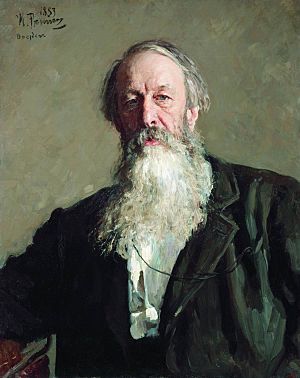Vladimir Stasov facts for kids

Vladimir Vasilievich Stasov (born January 14, 1824 – died October 23, 1906) was an important Russian expert in music and art. He came from a rich family and became a very influential person in Russian culture during the mid-1800s.
Stasov helped many talented artists and musicians become famous. He also encouraged them to create their best works. He believed that Russian art should be unique and not just copy European styles. He thought Russian artists could create amazing art by using their own country's traditions. For Stasov, "national" art meant art that showed people's lives and helped them understand the world better.
Contents
Early Life and Education
Vladimir Stasov was born in Saint Petersburg, Russia, on January 14, 1824. His father, Vasily Stasov, was a well-known Russian architect.
Vladimir Stasov finished his studies at the School of Jurisprudence in 1843. Later, he joined the Imperial Academy of Arts in 1859. In 1900, he became an honorary member of the Russian Academy of Sciences. This was a special honor he shared with his friend, the famous writer Leo Tolstoy.
Stasov's Career and Influence
Helping "The Five" Composers
In 1847, Stasov wrote about how the composer Mikhail Glinka used Russian folk songs in his music. From then on, Stasov strongly believed that Russian music should be truly Russian, not just like European music.
He became a trusted advisor to a group of Russian composers known as "The Five". These composers wanted to create a unique Russian sound. Stasov also supported Pyotr Ilyich Tchaikovsky. He encouraged Tchaikovsky to write music based on famous stories, like Shakespeare's The Tempest.
Supporting Realistic Painters
Starting in the 1870s, Stasov also strongly supported a group of realistic painters called the Peredvizhniki. He especially admired the artist Ilya Repin. These painters showed everyday life and important events in Russia.
Stasov's Strong Opinions
Stasov had very strong opinions about art and music. If artists did not follow his ideas, he could be very direct in his criticism. For example, he loved one part of Tchaikovsky's Little Russian symphony. However, he often felt that much of Tchaikovsky's other work was not as good.
He also had strong views about Modest Mussorgsky, another composer from "The Five." Even though he helped Mussorgsky, Stasov sometimes felt the composer lacked intellectual depth.
Stasov's letters to important Russian artists are very valuable today. They show his thoughts and feelings about the art world. He also had a famous disagreement with music critic Alexander Serov about the quality of Mikhail Glinka's two operas.
Stasov was very impressed by the writing talent of a young Jewish boy named Samuil Marshak. He even helped Marshak and his family get special permission to live outside certain restricted areas.
Vladimir Stasov's brother, Dmitry Stasov, was a well-known lawyer. He helped start the Russian Music Society. Stasov's niece, Elena Stasova, later became an important figure in the Soviet government.
 | Chris Smalls |
 | Fred Hampton |
 | Ralph Abernathy |


